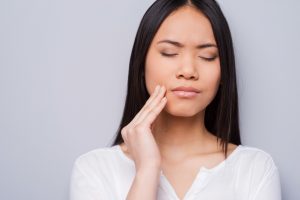Acid reflux and gastroesophageal reflux disease (GERD) are common conditions that affect millions of people. They cause stomach acids to back up into the esophagus and are often accompanied by other unpleasant sensations, such as heartburn. GERD can even increase the chances of esophageal cancer! If you suffer from GERD or frequent acid reflux, it’s important that you take steps to manage the condition. Today, your dentist in San Diego is here to talk specifically about how acid reflux can affect your oral health.
Stomach Acids Threaten Tooth Enamel
Tooth enamel is the hardest substance in the human body, but it isn’t invincible. The acids from GERD that sometimes back up into the mouth can quickly erode the teeth, stripping them of their outermost layer of protection. The result may be that your teeth become extra sensitive. They may also become more vulnerable to cavities.
Some groups are more prone to acid reflux and GERD than others. For example, obese people and those with diabetes tend to be at a higher risk. Pregnant women should also be aware that the hormonal changes they’re going through may lead to frequent acid reflux.
Protecting Your Teeth
If you struggle with GERD, there are some things you can do to ease your discomfort and protect your smile from erosion:
- Consult your physician. They may prescribe a medication or recommend an OTC treatment to help keep your stomach acids where they belong.
- Avoid trigger foods. Certain foods, such as chocolate, tomatoes, pineapple, soda, red wine, and anything with a high fat content, are known to cause acid reflux. It’s best to avoid your trigger foods as much as possible.
- Eat smaller meals. Large meals put more pressure on the sphincter that separates your esophagus from your stomach, thereby increasing the risk that acid will escape.
- After you eat, wait at least three hours before you lie down. Lying down can make it more likely that acid will creep into your esophagus.
- Drink plenty of water. Water can rinse away some of the acids in your mouth.
- Lose some weight. Shedding a few pounds can decrease pressure on your body and reduce incidences of acid reflux.
How Your Dentist Can Help
Dentists are often the first to notice signs of acid reflux, which is why it is so important to keep up with your biannual exams and cleanings. If your oral healthcare provider tells you that there are signs of erosion on your teeth, it may be time for you to visit a doctor to talk about your acid reflux.
Your family dentist in San Diego can also give you personalized oral hygiene tips that will help you to minimize the damage from the acid. If your teeth have already suffered damage because of acid problems, your dentist may also recommend a treatment option to improve their health.
Acid reflux is an uncomfortable condition that can have long-term consequences for your smile. We hope the above tips will help you care for your teeth and keep them strong despite any struggle with GERD that you may be having.
About the Dentist
Dr. Greg Friedman has decades of experience in dentistry. He has a strong focus on customer service and always wants his patients to feel like they can trust him to take care of any dental problem they may be having. If you are worried that acid reflux may be endangering your teeth, or you have other concerns about your smile’s health, please contact us at 858-682-2394.




